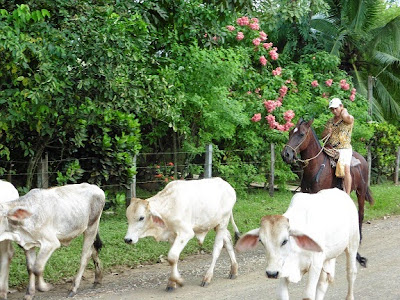I am staying in a very rural part of Guanacaste on the Nicoya Peninsula, two thirds of the way down towards the tip of this huge land mass hanging off of the west coast. Although the scenery is stunning and the beaches spectacularly beautiful, modern development has not reached this area partly due to the remoteness from any major towns and because of the primitive state of the mostly single lane roads. Also, while the surf is good here, it is not compared to some famous spots north and south of us, which draws huge numbers of surfers and has driven development there.
As a result the Ticos (Costa Ricans) live a very traditional lifestyle, little influenced by outside forces. pretty much as they have for generations. Life is centered around family and home in small villages that often occur at crossroads. Those who work usually do so locally and commute by walking, by motorcycle or car or even horseback! Gas is expensive and carefully consumed. Each village has a small grocery store or two and a “soda” which is a simple restaurant and bar and there is often a small mechanic shop as well. If you are low on gas out here (a bad idea) you ask around and get directed to someone’s house. You will pay a premium and say a prayer as whoever is home fills up your tank from recycled gallon jugs filled with gas and stored in a shed nearby. A funnel helps smooth the operation.
Here is a woman who was moving cattle through Pueblo Nuevo (the nearest town) last week, along with another herder on a motorcycle:
Sunday is specifically devoted to rest and many people take in a local futbol game or perhaps pay respects to ancestors at the local cemetery. My friend Wendy likes to place flowers on the graves in the tiny cemetery at Playa Bejuco and so she took me there last Sunday and we did just that, adding beach peas to the lonely graves without arrangements.
Tico homes in the area are pretty simple and always seem to have the front doors open. There are almost always flowers in the yard, a dog or two for protection and a flock of free range chickens. You cannot drive through a village of more than a few homes without seeing people gathered outside on the porch just visiting at at least one of them. Ticos seem to take time (or make it) for each other.
Of course, life is not perfect even though my outside superficial view sees these peaceful scenes. The middle class is shrinking, divorce is not uncommon, and corruption is dismayingly prevalent in government here. The price of food is high and many people subsist on rice and beans much of the time, not by choice. There are not enough jobs in the rural areas, which has only gotten worse here with the closing of several small restaurants and hotels along Playa San Miguel in the last few years.
On the other hand, universal health care is available and functions well, the democratic government and currency are stable and education is well funded. Several polls have rated Costa Ricans as the happiest people on earth (you can read about it online including an interesting NY Times article from 2010) and I am a daily witnes as to why.



No comments:
Post a Comment